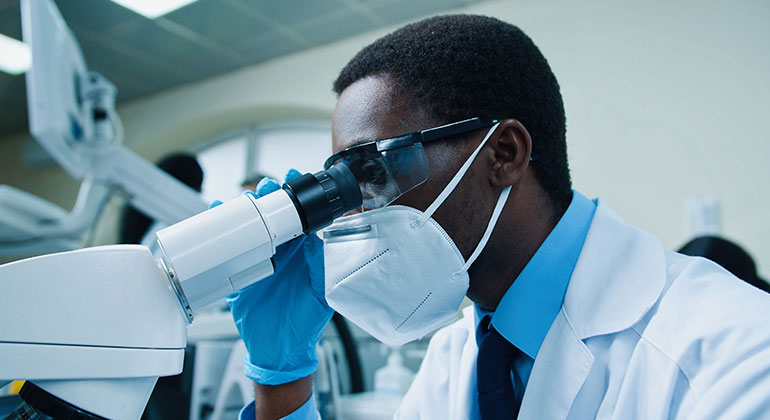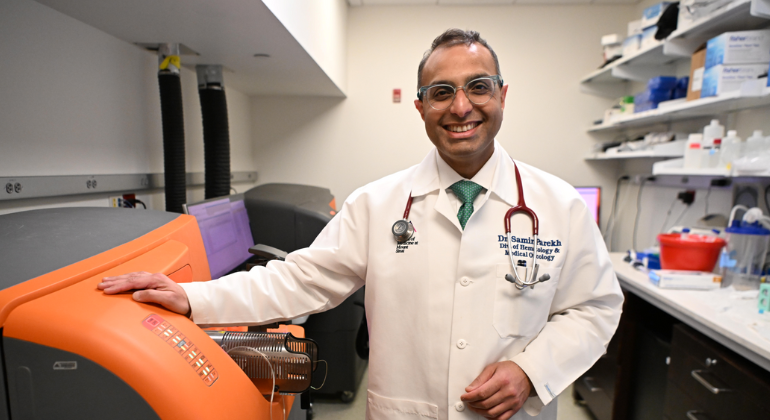400 Individuals Received Complimentary On-Site Melanoma Screenings at 2013 Aspen Ideas Festival
Mount Sinai dermatologists identified several melanomas and non-melanoma skin cancers at the screening.
In an effort to detect and prevent skin cancer, dermatologists from The Mount Sinai Medical Center in New York City performed approximately 400 complimentary melanoma screenings at the Aspen Ideas Festival (AIF) in Aspen, Colorado. Mount Sinai is the first medical center to sponsor the AIF held from June 26 through July 2, 2013.
The on-site screening team was led by Robert Phelps, MD, and Amylynne Frankel, MD, who are members of the Department of Dermatology at the Icahn School of Medicine at Mount Sinai. The screenings were held daily in the Kresge Foyer during the seven days of the Festival.
Skin cancer is the most common cancer in the world, and there is a steady increase in the most serious type of skin cancer: melanoma, the kind of cancer most likely to be fatal. According to the Melanoma Research Foundation, 1 in 50 Americans has a lifetime risk of developing melanoma. “Many people are at risk, but skin cancer is also one of the most preventable and treatable forms of cancer. When it is caught early the cure rate is nearly 100 percent," said Mark Lebwohl, MD, who is Professor and Chair of the Department of Dermatology at The Mount Sinai Medical Center, as well as president-elect of the American Academy of Dermatology.
At the AIF, Mount Sinai's dermatologists saw many Baby Boomers who said they were increasingly concerned about melanoma. "The higher incidence of skin cancers that we are seeing represents a delayed response to the behavioral changes that occurred in the 1960s and 1970s, including people going to the beach and sun worshipping, often using baby oil and reflectors,” said Dr. Phelps. “Many of them tell us they didn’t know any better then.”
AIF participant Connie Calaway of Carbondale, Colorado, said, "It was wonderful to be able to get a complimentary screening on-site, especially living in high altitudes where the sun is so intense." Ms. Calaway, who received a clean bill of health, said she would substitute her regular visit with her dermatologist with her Mount Sinai screening.
According to the Environmental Protection Agency (EPA), UV intensity increases with altitude because there is less atmosphere to absorb the damaging rays. "As a result, your chance of damaging your eyes and skin increases with high altitude," said Dr. Frankel. "In fact, many individuals had questions about sunscreen and what to do to protect themselves in high altitude."
During the screenings, Mount Sinai dermatologists said they identified several melanomas, two-dozen precancerous lesions and atypical moles, and 10-20 non-melanoma skin cancers, that is, basal cell carcinomas and squamous cell carcinomas.
“At Mount Sinai, we are making concerted efforts to catch melanomas and other skin cancers at the earliest stage,” Dr. Phelps added. “Particularly for melanoma, despite the advances that have been made in treatment, the most effective therapy to this day includes good screening, patient education and early surgical therapy.”
Another individual screened at the Festival was Kitty Boone, Vice President, Public Programs for The Aspen Institute and Director of the Aspen Ideas Festival. "We were delighted that Mount Sinai offered Aspen Ideas Festival participants the opportunity to have complimentary melanoma screenings with their dermatologists from New York,” said Boone. “Mount Sinai performed a real service. The great doctor who offered my screening was straightforward, incredibly instructive, and very helpful. These screenings were a great benefit to all of us, especially those of us that never paid much attention to sunscreen when we were young.”
During the Festival, Kenneth L. Davis, MD, President and CEO of The Mount Sinai Medical Center, spoke on the future of medicine and containing health care costs. Presented by the Aspen Institute and The Atlantic magazine, the Festival is unique in its dedication to dialogue and exchange, and in its commitment to bringing ideas to the public at large.
Researchers at the Icahn School of Medicine are involved in several breakthroughs in melanoma that improve survival rates. Ongoing clinical trials include therapies such as:
1. A Single Arm Open-Label Phase II study of Vemurafenib Followed by a Continuous Administration of Ipilimumab: A study to examine the safety of sequential (one after another) therapy of vemurafenib (Zelboraf®) and ipilimumab (Yervoy™), and find out whether this treatment schedule is safe for patients with regards to the main common side effects on the skin.
2. A Multi-center, Double-blind, Placebo-controlled, Adaptive Phase 3 Trial of POL-103A Polyvalent Melanoma Vaccine: A study to confirm the safety of the investigational vaccine POL-103A and test if its administration on a regular schedule can increase the immune system activity, which is thought to delay the melanoma from coming back.
3. A phase III, randomized, open-label study comparing the combination of the BRAF inhibitor, dabrafenib and the MEK inhibitor, trametinib to the BRAF inhibitor vemurafenib: A study to test two experimental drugs in combination, dabrafenib which targets the BRAF gene and trametinib which aims at a different cell signaling gene called MEK and see how well they work together compared to another drug vemurafenib (also known as Zelboraf®) which also targets the BRAF gene, for treating metastatic melanoma.
4. Establishing A Gene Signature for Early Stage Melanoma at High Risk of Reoccurrence: In this study, researchers have three aims: screen the dermatopathology database at Mount Sinai and identify melanoma specimens from patients who have recurrent versus non recurrent melanoma; establish a protocol for extraction of RNA from paraffin embedded primary melanoma tissues; and establish an inflammatory signature for early stage melanoma. (This is a non-treatment trial.)
# # #
About The Mount Sinai Medical Center
The Mount Sinai Medical Center encompasses both The Mount Sinai Hospital and the Icahn School of Medicine at Mount Sinai. Established in 1968, the Icahn School of Medicine is one of the leading medical schools in the United States, and is noted for innovation in education, biomedical research, clinical care delivery, and local and global community service. It has more than 3,400 faculty in 32 departments and 14 research institutes, and ranks among the top 20 medical schools both in National Institutes of Health funding and by U.S. News & World Report.
The Mount Sinai Hospital, founded in 1852, is a 1,171-bed tertiary- and quaternary-care teaching facility and one of the nation's oldest, largest and most-respected voluntary hospitals. In 2012, U.S. News & World Report ranked The Mount Sinai Hospital 14th on its elite Honor Roll of the nation's top hospitals based on reputation, safety, and other patient-care factors. Mount Sinai is one of 12 integrated academic medical centers whose medical school ranks among the top 20 in NIH funding and by U.S. News & World Report and whose hospital is on the U.S. News & World Report Honor Roll. Nearly 60,000 people were treated at Mount Sinai as inpatients last year, and approximately 560,000 outpatient visits took place.
About the Mount Sinai Health System
Mount Sinai Health System is one of the largest academic medical systems in the New York metro area, with 48,000 employees working across seven hospitals, more than 400 outpatient practices, more than 600 research and clinical labs, a school of nursing, and a leading school of medicine and graduate education. Mount Sinai advances health for all people, everywhere, by taking on the most complex health care challenges of our time—discovering and applying new scientific learning and knowledge; developing safer, more effective treatments; educating the next generation of medical leaders and innovators; and supporting local communities by delivering high-quality care to all who need it.
Through the integration of its hospitals, labs, and schools, Mount Sinai offers comprehensive health care solutions from birth through geriatrics, leveraging innovative approaches such as artificial intelligence and informatics while keeping patients’ medical and emotional needs at the center of all treatment. The Health System includes approximately 9,000 primary and specialty care physicians and 10 free-standing joint-venture centers throughout the five boroughs of New York City, Westchester, Long Island, and Florida. Hospitals within the System are consistently ranked by Newsweek’s® “The World’s Best Smart Hospitals, Best in State Hospitals, World Best Hospitals and Best Specialty Hospitals” and by U.S. News & World Report's® “Best Hospitals” and “Best Children’s Hospitals.” The Mount Sinai Hospital is on the U.S. News & World Report® “Best Hospitals” Honor Roll for 2025-2026.
For more information, visit https://www.mountsinai.org or find Mount Sinai on Facebook, Instagram, LinkedIn, X, and YouTube.
Mount Sinai’s Staten Island Cancer Center Moves to New Site
Nov 09, 2023 View All Press Releases
Researchers Find Treatment Options for Patients Whose Blood Cancer Relapses After CAR-T
Nov 04, 2022 View All Press Releases
Study Identifies New Gene That Drives Colon Cancer
Oct 14, 2022 View All Press Releases




